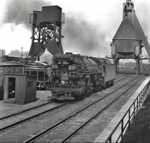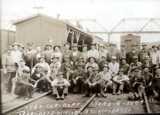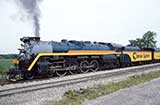
 |
 |
Articulated 2-6-6-2's at Silver Grove
What's 2-6-6-2 mean? Wikipedia knows.
 |
 |
 |
| This Big Train, at Silver Grove, is C & O #1421, a 2-6-6-4, in the year 1950 |
This Big Train, at Silver Grove, is C & O #195, an 0-8-0, from July, 1931 |
This Big Train, at Silver Grove, is C & O #711, an 2-8-0, from 1949 |
Stevens Yard, Silver Grove
 |
C & O “depot” at Stevens
![]()
The track plan, 1913
| It says here that one of the reasons the C&O built at Silver Grove was because it eyed a bridge across the river to at that point. There's a map of the plan here. | |
| “Silver Grove . . .has immense yards, consisting of about 40 miles of tracks, with a capacity sufficient to accommodate 3,200 cars. Coal in enormous quantities west-bound from Kentucky, Virginia, and West Virginia fields, is brought to Silver Grove yards in train loads o from 80 to 85 cars each. The strength of the bridges and viaducts west of Silver Grove is such that heavy locomotives in use east of that point cannot be operated any further west; thus making it necessary to break trains west-bound from this point into two trains.” The Southwestern Reporter, 1921 | “An extensive yard and terminals have been completed during the year at Silver Grove, Kentucky, about 12 miles east of Cincinnati, at a total cost of $919,373.66. The increased facilities thus afforded for the handling of your Company's traffic over the Cincinnati Division have been much needed, owing to the rapid increase in coal tonnage moved westward, and should lead to further economies of operation.” from the Chesapeake and Ohio Annual Report, 1938 |
| There are a bunch of Silver Grove railroad pictures at the C&O Historical Society site. Search for Stevens, not Silver Grove, at their archives. | |
| “Present engineering and construction engagements of Westinghouse, Church, Kerr & Co. include the following shop work Chesapeake & Ohio Railway at Silver Grove, Ky.: thirteen stall roundhouse, power house, planing mill, storehouse, pumping plant for delivering 1,000,000 gallons per twenty-four hours from Ohio River, coaling station, fuel tank, and water tank.” Electrical World, 1911 | |
![]()
C&O 1504, a class H-7 2-8-8-4
From a Facebook post by Fernando Luna
Stevens Yard
From a Facebook post by Charles DeMoss
C&O Car Department, August 9, 1929
From a Facebook post by Frank Kramer
Chessie 2101, earlier, The American Freedom Train
It's background, and tragic demise in Silver Grove.
YouTube has lots of video's of the train in action.
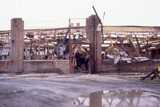 |
 |
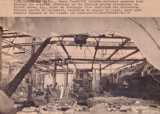 |
|
| The Silver Grove Roundhouse fire, which destroyed Chessie 2101, above. | |||
| C&O Switcher 5051, working Stevens Yard | |
| |
|
|
| C & O 6406 at Silver Grove, January 2, 1971. ;An EMD GP9 built in 1956. |
C & O 8106 at Silver Grove, February 27, 1971. It' a U25B built 1963 |
C & O 2221 at Silver Grove, November 25,1967 |
 |
 |
| C&O 5972, an EMD GP9, At Stevens, June17, 1971 | C&O 6212, an EMD GP9, At Stevens, January 2, 1971 |
 |
 |
 |
The C & O in Silver Grove
Working the hump yard at Silver Grove could be dangerous, but it did inspire poetry. Read it here.
 |
 |
 |
| Here's the train that brought workers to Silver Grove from Covington, a.k.a. The Chippy, (because it picked up railroad men.) |
||
 |
 |
 |
|
| The Chippy at the station | Once upon a time, everybody heated with coal. | #1130 | |
| From Facebook posts by Ray Rice | |||
Work Crane #1 at Silver Grove in 1970
 |
 |
|
| Stevens Roundhouse from the City of Silver Grove's History page |
Big Trains, in Silver Grove | Roundhouse fire at Silver Grove's Stevens Yard |
 |
| George W. Stevens, for whom the Silver Grove railroad yard was named. His 1920 obituary. He died “while dictating a letter to a stenographer.” |
| At one time, it wasn't gonna be Silver Grove, it was gonna be Stevensville. |
![]()



